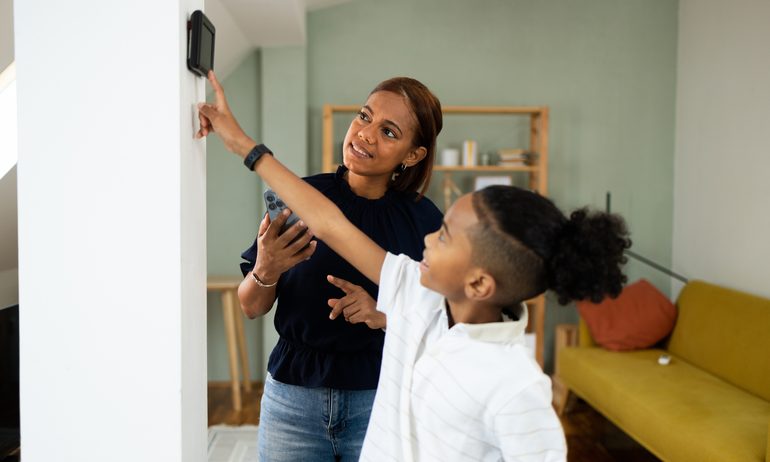2025 Cost of Home Safety Report
Many Americans have home security systems for peace of mind, but their financial safety could be at risk due to lack of savings for home maintenance needs, according to a new NerdWallet survey.

Some or all of the mortgage lenders featured on our site are advertising partners of NerdWallet, but this does not influence our evaluations, lender star ratings or the order in which lenders are listed on the page. Our opinions are our own. Here is a list of our partners.
Money may not buy happiness, but it can arguably buy safety, or at least the feeling of safety. According to a new NerdWallet survey, the majority of Americans with a home security system (88%) say it makes them feel safe.
The survey of more than 2,000 U.S. adults, conducted online by The Harris Poll, asked Americans about their home security systems, or lack thereof. We also asked them about home warranties and whether they have money set aside for home maintenance, to assess how safe they might be from taking on high interest debt in the event of an unexpected breakdown in their home’s appliances or systems.
Key findings
Home security systems are a need for some; others opt out due to cost. Most Americans with a home security system (85%) say a good system is a necessity for them. Of those who don’t have a home security system, a third (33%) cite the expense as a reason why.
Some choose not to have a home warranty due to cost or savings on-hand. Of homeowners who don’t have a home warranty, 33% say it’s too expensive and 25% say they have adequate savings to cover necessary repairs.
Preventative maintenance isn’t a priority for many homeowners. The survey found that more than 3 in 5 homeowners (61%) tend to fix or replace things as they break rather than keep up with preventative maintenance.
"Homeowners are weighing costs and benefits when they decide whether to buy security services and home warranties, and that's admirable," says Holden Lewis, home and mortgage expert for NerdWallet. "I just sold an inherited house with tons of deferred maintenance. It convinced me that it's wise to keep up with maintenance and repairs. But keeping a home in good shape costs money and time, and people are busy. We put things off."
Home security systems bring a sense of safety for many
Nearly 3 in 5 Americans (57%) say they have home security systems, either professionally-monitored, self-monitored or a combination of both. More than three-quarters of parents with minor children (76%) have a home security system, and 65% of Americans who live in urban areas have one.
There are pros and cons to both professionally-monitored and self-monitored security systems. The survey found that a few reasons why Americans who opt for a professionally-monitored system did so are a faster emergency response (36%), lowered home insurance premiums with a monitored system (23%) and lack of desire to monitor their own system (18%). Meanwhile, those with a self-monitored system cited a preference for managing their own system (41%), lack of monitoring costs (35%) and privacy concerns (32%) as a few reasons why they chose it. Both groups say they chose their system because it brings them peace of mind — 49% and 50%, respectively.
A majority of Americans with a home security system say it makes them feel safe (88%), and 85% say a good home security system is a necessity for them. Still, over a quarter of Americans with a home security system (28%) regret purchasing it.
Meanwhile, more than 2 in 5 Americans don’t have a home security system (43%). The top reasons they cite for this is not thinking they need one (35%) and the expense (33%).
Savvy safety strategy: While a home break-in can happen to anyone, some may decide the risk isn’t high enough to justify the expense of a security system. If you live in a low crime area, aren’t keeping valuable assets at home and feel otherwise safe, you might opt to go without. But for those who are considering a home security system, there are a few different options to consider — professionally- or self-monitored systems.
Security system costs may range from a couple hundred to several thousand dollars, based on the monitoring capabilities and installation needs of your home. For those who would prefer emergency responders to be alerted promptly in the event of a break-in or who otherwise don’t want to monitor a system themselves, a professionally-monitored system may be the way to go. For those who want to save money by monitoring themselves or have privacy concerns about third-party monitoring, they might opt for a self-monitored system.
In addition to the added peace of mind a security system brings, you might get some cost savings out of the deal — ask your homeowners insurance provider if they offer discounts for home security systems.
"Lower insurance premiums are a compelling reason to get a home security system," Lewis says. "And if it gives homeowners peace of mind, that's great. On the other hand, having a home security system could have the unintended effect of making homeowners feel unsafe if they check an app frequently and freak out about every delivery and knock on the door while they're away."
Some opt out of home warranties due to cost
While home security systems can help secure a person’s physical safety, a home warranty might provide some financial safety.
A home warranty is meant to protect a home’s appliances and systems, depending on the plan. In exchange for the cost of an annual premium and potential service fees, a warranty can help cover breakdowns due to wear and tear. So if your refrigerator stops working, a warranty might cover repairs or replacement — up to the limit outlined in the terms of the contract. A home warranty differs from homeowners insurance; the latter is meant to cover accidental damage, rather than expected wear and tear.
Home warranties may save a person money, but they aren’t for everyone. Of homeowners who don’t have a home warranty, 33% say it’s too expensive, according to our survey. A quarter of homeowners without a warranty (25%) say it’s because they have adequate savings to cover necessary repairs and 23% say it’s because they think home warranties are a scam.
Still, many would consider a home warranty in the future. The survey found that more than 3 in 5 Americans (62%) say if they bought a new home, they’d purchase a home warranty.
Savvy safety strategy: A home warranty likely isn’t worth the cost for everyone. If your home’s systems or appliances are liable to break down in the near future and are not covered by the manufacturer’s warranty, a home warranty may save money. Consider the repair or replacement costs of your home’s older appliances and systems when deciding if the premium and service costs make sense for you.
If your appliances and systems are relatively new or even under manufacturer warranties, you can probably skip a home warranty.
You might also opt to skip the warranty and “self-insure,” if you can save the cash to replace or repair things that break in your home. In other words, instead of paying a premium and service fees, having the money set aside in a savings account earning interest might be the better financial move. (Note: Opting out of homeowners insurance is another matter entirely, and we don’t recommend that in the vast majority of cases.)
"A home warranty has the most value when the appliances and systems have aged out of manufacturer's warranties," Lewis says. "When something breaks, you typically have to pay for a service call. That also means that you don't have to search for a reliable provider, because the warranty company has done that work already."
Preventative maintenance is on the back burner for some
Most homeowners (85%) say they’re able to afford the basic maintenance and upkeep of their home, but some Americans may be able to save on their costs with a fix-it-first approach and preventative maintenance.
According to the survey, 56% of homeowners say they’re more likely to just replace something that breaks in their home rather than try to fix it. And around 3 in 5 homeowners (61%) tend to fix or replace things as they break rather than keep up with preventative maintenance.
Savvy safety strategy: As a homeowner, it’s likely that you’ll run into maintenance issues you weren’t planning on. According to the American Housing Survey from the U.S. Census Bureau, routine maintenance cost homeowners $1,356, on average, in 2023. And according to our survey, just 32% of homeowners have money saved specifically for home repairs or maintenance. The more cash you have in reserve for these inevitabilities, the safer you’ll be from having to take on costly debt to care for your home.
When something breaks in your home, see if it’s fixable before immediately replacing it. If it is, consider whether this is a repair that can be done DIY after watching a few YouTube videos, or if you need to hire out. For the pro route, get at least two estimates to determine if the cost of repair is low enough that it’s worth it to fix it, rather than purchase a new item outright. This evaluation takes additional work, but the savings could be worth the effort. Plus, you might learn something new that helps you continue to save money as a homeowner when related problems arise.
It’s said that an ounce of prevention is worth a pound of cure. Being diligent about preventative maintenance on your home could save a lot of money on future repairs or potential replacements. Download a home maintenance checklist to help you keep your dwelling in tip-top shape.
"Once or twice a year, it's a good idea to walk through the house as if you've never been in it before and you're thinking about buying it," Lewis said. "Viewing it with fresh eyes, you will notice the little things that you've been ignoring: the chipped doors on the bathroom cabinet, the toilet that takes forever to refill after flushing, and the torn window screens. You can tackle these items when you have the time and money, rather than letting problems accumulate to the point of feeling overwhelming."
Methodology
This survey was conducted online within the United States by The Harris Poll on behalf of NerdWallet from June 2-4, 2025, among 2,090 U.S. adults ages 18 and older. The sampling precision of Harris online polls is measured by using a Bayesian credible interval. For this study, the sample data is accurate to within +/- 2.5 percentage points using a 95% confidence level. This credible interval will be wider among subsets of the surveyed population of interest. For complete survey methodology, including weighting variables and subgroup sample sizes, please contact [email protected].
Disclaimer
NerdWallet disclaims, expressly and impliedly, all warranties of any kind, including those of merchantability and fitness for a particular purpose or whether the article’s information is accurate, reliable or free of errors. Use or reliance on this information is at your own risk, and its completeness and accuracy are not guaranteed. The contents in this article should not be relied upon or associated with the future performance of NerdWallet or any of its affiliates or subsidiaries. Statements that are not historical facts are forward-looking statements that involve risks and uncertainties as indicated by words such as “believes,” “expects,” “estimates,” “may,” “will,” “should” or “anticipates” or similar expressions. These forward-looking statements may materially differ from NerdWallet’s presentation of information to analysts and its actual operational and financial results.








